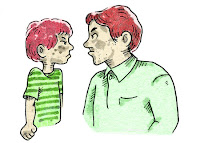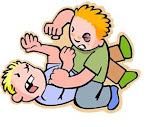Discipline for Back-Talk

It can feel like a real kick to the groin when your youngster speaks to you in a nasty tone of voice. For all you've done for her, it would be nice to get some respect in return! But responding with your own rude comment (though satisfying) isn't the best strategy, no matter your youngster's age. Bite your tongue while you pinpoint what's prompting the sassiness. Ages 3 to 6: You're witnessing the first signs of autonomy. He's figured out that he's different from you — and he's letting you know it. At this age, he doesn't know that those defiant comments aren't so nice (after all, people on TV call each other "stupid" all the time – and maybe those words have also slipped from your lips). Don't overreact, but do let him know that he's hurt your feelings. Keep cool, and then move on. Ages 7 to 11: Now, she's talking back to test your rules and reactions. Instead of stooping to her level, model respect so she learn...

